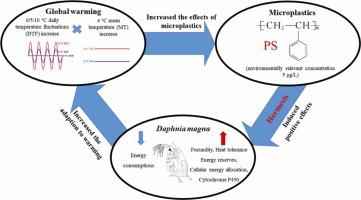Ecotoxicology and Environmental Safety ( IF 6.2 ) Pub Date : 2022-12-21 , DOI: 10.1016/j.ecoenv.2022.114416 Mengjie Chang 1 , Mingyang Li 1 , Wencheng Xu 1 , Xin Li 2 , Jian Liu 1 , Robby Stoks 3 , Chao Zhang 1

|
The ecological risk assessment of microplastics under global warming receives increasing attention. Yet, such studies mostly focused on increased mean temperatures (MT), ignoring another key component of global warming, namely daily temperature fluctuations (DTF). Moreover, we know next to nothing about the combined effects of multigenerational exposure to microplastics and warming. In this study, Daphnia magna was exposed to an environmentally relevant concentration of polystyrene microplastics (5 μg L−1) under six thermal conditions (MT: 20 ℃, 24 ℃; DTF: 0 ℃, 5 ℃, 10 ℃) over two generations to investigate the interactive effects of microplastics and global warming. Results showed that microplastics had no effects on Daphnia at standard thermal conditions (constant 20 °C). Yet, microplastics increased the fecundity, heat tolerance, amount of energy storage, net energy budget and cytochrome P450 activity, and decreased the energy consumption when tested under an increased MT or DTF, indicating a hormesis effect induced by microplastics under warming. The unexpected increase in heat tolerance upon exposure to microplastics could be partly explained by the reduced energy consumption and/or increased energy availability. Overall, the present study highlighted the importance of including DTF and multigenerational exposure to improve the ecological risk assessment of microplastics under global warming.
中文翻译:

微塑料通过毒物兴奋效应提高全球变暖下大型溞的耐热性
全球变暖背景下微塑料的生态风险评估日益受到关注。然而,此类研究主要集中在平均温度(MT)的增加,忽略了全球变暖的另一个关键因素,即每日温度波动(DTF)。此外,我们对多代人接触微塑料和变暖的综合影响几乎一无所知。在这项研究中,大型溞在六种热条件(MT:20℃、24℃;DTF:0℃、5℃、10℃)下暴露于环境相关浓度的聚苯乙烯微塑料(5μgL −1 )中,历经两代。研究微塑料和全球变暖的相互作用。结果表明,在标准热条件(恒定 20 °C)下,微塑料对水蚤没有影响。然而,在增加 MT 或 DTF 的情况下进行测试时,微塑料增加了繁殖力、耐热性、能量储存量、净能量预算和细胞色素 P450 活性,并降低了能量消耗,这表明微塑料在变暖条件下会产生毒物兴奋效应。接触微塑料后耐热性意外增加,部分原因是能源消耗减少和/或能源可用性增加。总体而言,本研究强调了将 DTF 和多代暴露纳入其中对于改善全球变暖下微塑料生态风险评估的重要性。











































 京公网安备 11010802027423号
京公网安备 11010802027423号